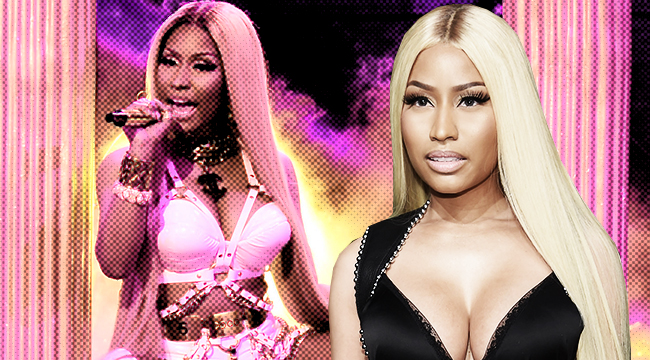
As I listened to Nicki Minaj spill her guts to Zane Lowe during today’s interview on Beats 1 Radio, I was struck by the vulnerability she portrayed in her candid, revelatory answers to his questions about the Meek Mill and Drake beef and “Motorsport” controversies. That is to say, I noticed how that vulnerability stood out in stark contrast to the “rules” of pre-millennial rap. Rappers aren’t supposed to be vulnerable. They aren’t supposed to describe themselves as “hurt” by the behavior and commentary of fickle, fairweather fans.
In the era Nicki (and I) grew up in, rappers were invincible, ghetto superheroes, their stories of struggle and street-centered trauma as much a mask as the zany or stoic tough-guy personas they adopted — usually under the advice of a major label marketing department. Yet, here was Nicki, revealing her inner turmoil and all-too-human emotional reactions to perceived betrayals and personal strife, even while she used the same time to drop not just one, but two rappity-rap flex singles in “Chun-Li” and “Barbie Tingz.”
While it’s not totally unusual to hear rappers talk about turmoil on their focus-grouped singles or on album cuts specially set aside to be the “deep, introspective” tracks and promote the idea of relative complexity, it is extremely different to see that personhood on full display outside of the music. In general, a rap alter ego is the facade the person hides behind, exaggerating and contorting the details of the person’s autobiography to create a filtered, acceptably entertaining version of that personal history and their own reactions to it.
Nicki’s well-known for extending this conceit with her multiple personalities, the “Harajuku Barbie” and “Roman Zolanski,” among others. She distends the contours of her natural, buoyant, silly, boisterous personality to cartoonish proportions, growling her rhymes through animal snarls and helium-voiced innocence to disorienting effect. It makes her more snappy, more marketable, bigger, bolder, entertaining, but it also has the side effect of flattening her real self, Onika Maraj, behind the front. Fans tend to see her as her characters, not as herself, not as the human being that she is and was before she ever picked up a mic or donned a skintight, latex catsuit.
https://www.youtube.com/watch?v=3TCcDE4fi4Y
This makes it easier for those fans to pick her apart, to judge, to speculate, to berate, to demean, and to demand as they do with most any star. It’s easy to forget that there’s a person behind the persona, someone for whom words can be as sharp as physical darts — or even more so, considering words are a rapper’s tradecraft, so they have an acute understanding of words and their effects and intent. A snarky, one-off joke on Twitter can read to the real person reading the screen like a dagger to the ribs, especially with the cumulative effect that millions of people making the same “joke” can have. A bee sting may only hurt so much, but a thousand stings from an entire hive are enough to kill. So it is with a Beyhive as well.
In her interview with Lowe, Nicki reminded us of the damaging effect our entertainment can have on the players in the lead roles of our favorite, digital traumas. When Drake and Meek Mill traded barbs via lyrical fisticuffs all while being goaded by legions of Twitter provocateurs, Onika suffered in silence, torn between the love of her friends and her man. When fans attempt to pit her against Cardi B and Remy Ma and whoever else for the fifty-eleventh time over every lyrical over-analysis of a random throwaway line, I can imagine her disappointment or distress at being misread yet again, whether deliberately or incidentally, especially without receiving support from her colleagues and collaborators.
She fights to advance the cause of women in rap, championing for up-and-comers while recognizing that her presence is kicking open doors and granting opportunities for them to simply stroll through while she picks the splinters from her flesh. It’s enough to bring anyone to tears.
https://youtu.be/FCB0EWsYGdM
Which is why it’s so remarkable that she actually shed those tears on such a public forum as Beats 1 Radio, knowing that the peanut gallery would be listening and waiting for the next misstep, the next perceived weakness to exploit and attack for cheap thrills online (there are already videos cropping up on Youtube criticizing her for the tearful interview). She opened herself up in a way that isn’t possible through music, where the format and presentation by nature leech some of the impact and importance from the words. The spontaneity of her reaction is what gives it pathos; the audacity of it is what gives it weight.
Nicki should have nothing to be ashamed of, but hip-hop is a capricious culture even in the best of times. Too many of its fans consider it a contact sport; if you can’t take the bumps and bruises, you shouldn’t play. They forget that no matter how superhuman the athlete or stoic the mask, bumps and bruises do still hurt, they do add up, and they can result in serious injury. Hopefully, the fact that Nicki Minaj was willing to drop the act for just a moment serves as a reminder that there are real lives and emotions at stake, and that it’s okay to occasionally recognize that and cut our stars a little more slack. They are, after all, only human.






